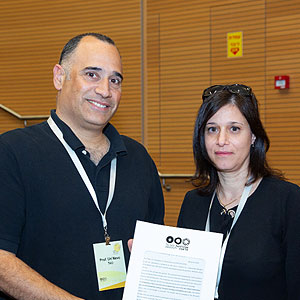Smartphones take part in any aspect of human behavior and as such, they offer a great promise as a probe of human behavior. We developed a technology for passive sensing of human behavior using smartphones. Our platform uses the multiple sensors and logs that are continuously recorded in smartphones to create a model of the behavior of a user. The features and the algorithms that characterize this behavior, allow detection of anomalies in this behavior. We demonstrated a unique capability in providing early detection of mental health relapses, using this platform.
Mild Cognitive Impairment (MCI) is a neurological disorder, occurring mainly in the aging population, and that affects multiple tasks related to memory and cognition. Recent clinical studies demonstrated that Hyperbaric oxygen therapy (HBOT) could induce neuroplasticity that leads to the enhancement of cognitive functions and improve quality of life in patients suffering from chronic neuro-cognitive impairment. Here we propose to test the feasibility of using our passive sensing technology to track the kinetics of MCI treatment. We will detect the behavioral changes in MCI patients and in normal aging volunteers by comparing the digital markers of behavior counter a clinical cognitive assessment. We will also test changes in the severity of MCI that is expected to be induced by HBOT and by rehabilitative treatment.
Our vision is that passive sensing will become a clinical modality allowing sensitivity to deterioration or to the effect of treatment in MCI and in other neurological disorders.
Passive sensing of behavioral changes using smartphones
Passive sensing of behavioral changes using smartphones in patients with mild cognitive impairment (MCI)

Prof. Uri Nevo & Dr. Merav Catalogna
Prof. Uri Nevo is chairman of the Department of Biomedical Engineering in Tel Aviv University.
Prof. Nevo did all academic degrees in the School of Physics and Astronomy in Tel Aviv University. He served as a postdoctoral Fulbright fellow in the NIH, in Bethesda, MD, and joined the Dept. of BME in TAU as a faculty member in 2009.
Prof. Nevo’s primary academic achievements include the development of the theory of Ecoimmunity and the work on biomedical applications with a portable MRI system.
In 2010, Prof. Nevo co-founded & served as the first academic director of the President Peres' program for nurturing Israel's future scientists and inventors, Tel-Aviv University. In 2015 he founded Lifegraph: a company that leads a technology for behavioral monitoring using passive sensing.
Dr. Merav Catalogna is a research scientist in Sagol Center for Hyperbaric Medicine and Research Assaf Harofeh Medical Center, Israel. She brings over 15 years of experience in multidisciplinary research and development projects from both the academia and the biomedical industry. Her areas of expertise include system engineering, medical signal processing, and machine learning applications, functional, and diffusion tensor MRI imaging, and bio-statistics.
Dr. Catalogna received a B.Sc degree in Physics, M.Sc and Ph.D degrees in Biomedical Engineering from Tel Aviv University.